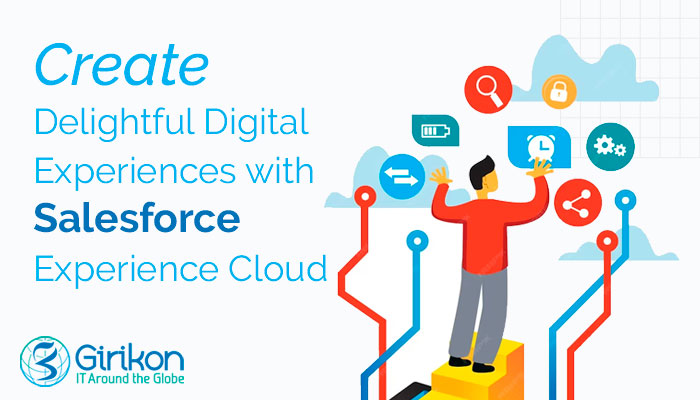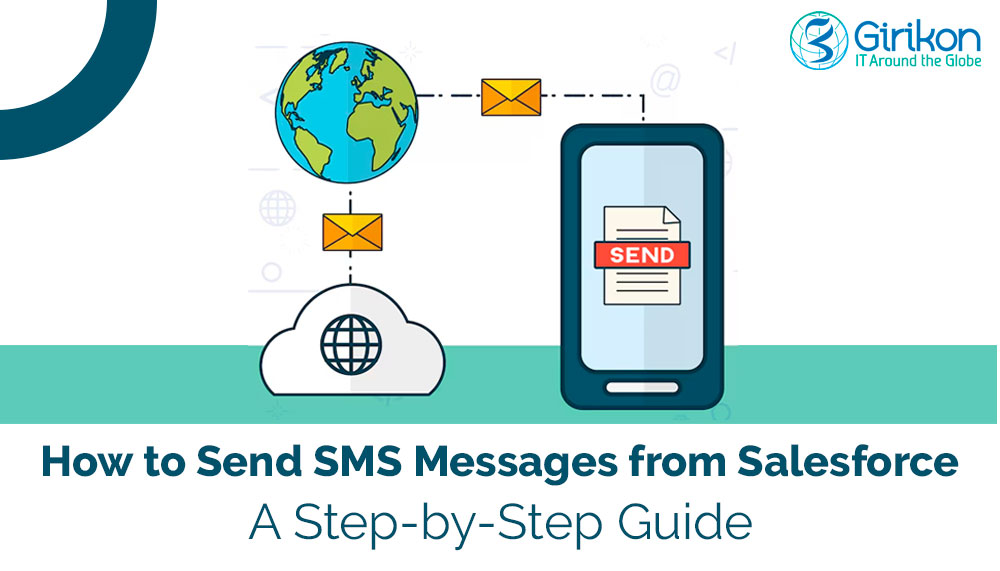Our Blogs
Table of content
- What is Salesforce Experience Cloud?- Features of Salesforce Experience Cloud
- Benefits of Salesforce Experience Cloud
- Final Words:
In today’s competitive business landscape, it has become challenging for organizations to provide seamless experience to customers across various touchpoints by connecting partners, customers and employees. This can lead to missed opportunities, reduced customer satisfaction and operational inefficiencies. To address these issues, organizations are turning to Salesforce Experience Cloud for developing next-generation digital experiences for engaging with key stakeholders, increasing sales and delivering customer-centric services. It makes sense to partner with a certified Salesforce Consulting Company to know more about this platform.

What is Salesforce Experience Cloud?
Earlier known as Salesforce Community Cloud, The Salesforce Experience Cloud comprises a suite of features integrated into the Salesforce Customer Relationship Management (CRM) platform. It empowers to create "digital experiences" that link to their CRM seamlessly, with a key focus on engagement of customers and the empowerment of partners. The platform ensures advanced security features and smooth system performance. The cloud platform enables users to generate multiple websites and tailor them to meet their specific business needs. The cloud solution fosters strong relationships with partners and enhances collaboration and channel management within the sales team. It also promotes community engagement and facilitates enhanced interactions with customers, experts, and partners.
Features of Salesforce Experience Cloud
Some of the top features of Salesforce Experience Cloud that can be leveraged by businesses to improve customer experience include the following:
Business Integration: The Salesforce experience cloud includes a set of functionalities within the Salesforce CRM platform that empowers businesses to enhance their platform capabilities through the seamless integration of third-party applications. These applications can be readily accessed on Salesforce AppExchange – where businesses can select applications that align with their specific needs. Addressing customer inquiries becomes easy when businesses incorporate customer support applications into the Salesforce Experience Cloud (SFEC).
Customer 360: Consumers are inclined to choose a brand that guarantees a personalized experience. By leveraging Salesforce Customer 360, users gain the ability to consolidate customer data into a unified view, accessible across different departments. The Experience Cloud offers automated suggestions for connecting with experts, groups, and content, tailoring these recommendations to individual interests, requirements, and behavior, thereby encouraging more active engagement within the community.
Mobile-friendly: With Salesforce experience cloud, it’s possible to connect with each on any device and from any location. By using Salesforce mobile applications, it’s possible gain access to digital interactions while providing a high-quality and responsive mobile experience.
Analytics: With Experience Cloud, users gain the ability to access and organize all the necessary data for generating reports and dashboards, enabling them to monitor the progress of their business effectively.
Low Coding Interface: Crafting stunning, and feature-packed digital interactions using Experience Cloud can be achieved without the need for high-end coding skills. Every website is constructed using the Builder, an intuitive drag-and-drop experience builder tool.
Native Solution: One major advantage of using Salesforce Experience Cloud is the provision of high-level protection against unauthorized access. All data processing takes place within the Salesforce platform, rather than on third-party servers, which further enhances security.
AppExchange: To improve customer experience, users can download and install variety of applications. Furthermore, organizations can effectively build and manage their knowledge base by utilizing knowledge management applications.
Benefits of Salesforce Experience Cloud
Some of the crucial benefits of this platform include the following:
Reduced Churn: Any business can experience a reduction in customer churn rates by using a recurring revenue model. However, to ensure consistency in reducing the churn rates, organizations should focus on increasing customer engagements. Salesforce Experience Cloud offers a portal that simplifies the management of all customer-related information and services, thereby promoting greater engagement, reducing churn rates, and enhancing overall operational efficiency.
Self-service Option: Customers today expect quick and easy access to the information they desire. To fulfill this demand, businesses can offer self-service solutions through Salesforce Experience Cloud. One effective approach involves setting-up a knowledge repository that provides answers to commonly asked questions by customers. Additionally, a community forum can be established, enabling customers to post their queries, offer solutions, exchange tips and techniques, and connect with fellow users. Another highly efficient self-service mechanism involves employing chatbots, harnessing artificial intelligence to deliver immediate responses to customer inquiries.
Measure and Optimize: It is essential for organizations to assess and enhance the performance of their Salesforce Experience Cloud platform. This involves utilizing analytics and metrics to monitor customer engagement, satisfaction, and conversion rates and leveraging this data to drive ongoing enhancements to your platform. Salesforce Experience Cloud offers a range of analytical and reporting tools to aid in the evaluation and improvement of performance. These tools include real-time dashboards, customizable reports, and AI-driven insights that empower organizations to monitor crucial performance indicators and acquire valued insights into customer behavior and preferences. For instance, organizations can use the engagement metrics provided by Salesforce Experience Cloud to keep a track of the duration customers spend on their platform, the pages they visit, and the actions they undertake.
Interaction with Remote Employees: Effective customer engagement plays a significant role in driving business success and growth. Through this engagement and ongoing communication, businesses gain insights into their challenges and key performance indicators (KPIs), enabling customers to provide business-oriented solutions. By utilizing the Experience Cloud as a platform, employees can ensure smooth interactions, even with remote colleagues, thereby preventing last-minute problem.
Partner Management: With Salesforce experience cloud, management of clients and customers has become easier than before. It optimizes lead generation and sales procedures, ensuring a outstanding customer journey at every step. Additionally, it enhances partner onboarding, recruitment, training, and support through user-friendly functionalities and tools integrated into the Salesforce portal, ensuring a smooth user experience.
Final Words:
Ensuring a smooth and effortless customer journey is crucial for the growth and success of any enterprise, and Salesforce Experience Cloud equips businesses with the tools to enhance the customer experience. So, if you are looking to create digital interactions that that not just satisfies but also surpasses your customers' expectations then you must consider getting in touch with one of the best Salesforce Implementation partners to implement this cloud platform.

 +61-1300-332-888
+61-1300-332-888 +1-480-382-1320
+1-480-382-1320







































